Updated June 30, 2023 at 3:45 PM ET
One of Chedino Martin's first memories is of a woman in red standing in the doorway of her grandmother's house in Heideveld, a suburb in the Athlone part of Cape Town, South Africa. It was 1986. Chedino, 39, was only 3 years old at the time but still remembers the moment clearly.
"It was raining. There was this red cloak. Then it fell away, and I saw a gorgeous, elegant woman standing in a silver foil dress with these long black curls and this broad smile," she recalls.
The woman in red was Chedino's aunt, Sharon. Sharon had just won that year's local chapter of the Spring Queen beauty pageant, a competition organized by textile workers. "I knew one day, someday, that was going to be me," Chedino continues.
Chedino might have grown up surrounded by the glamor of pageantry — her mother and her aunt were both successful beauty queens — but her early childhood was filled with turbulence and pain.
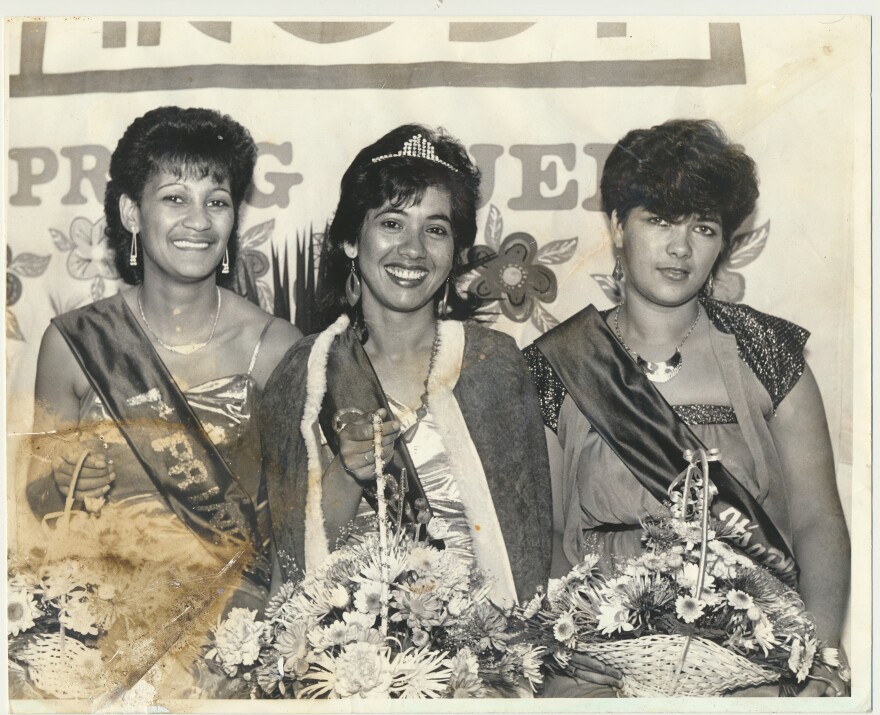
Chedino's biological father left before she was born and refused to accept her as his child. For a brief time, Chedino and her mother, Alma, were homeless. And sometime before Sharon's fateful visit, Alma abandoned Chedino to go on holiday. Were it not for her aunt's dropping by the house on Christmas Day only to find her niece lying on the floor, Chedino likely would have died from exposure.
The memory of seeing Sharon in that doorway is one of the few things Chedino remembers from that period in her life. Much of the rest she blocked out.
In South Africa, beauty pageants have played an important role in the country's social fabric since the beginning of the 20th century.
The Spring Queen competition, which is one of the oldest and largest pageants in South Africa, and in which Sharon participated, was established by the Southern African Clothing and Textiles Workers' Union as a means of supporting the 1973 Durban strikes and the 1976 Soweto Uprising.
After 1994, as South Africa's regime of segregation and discrimination was being torn down and Archbishop Desmond Tutu's "The Rainbow Nation" was rising from the ruins, LGBTQ rights rose along with it.
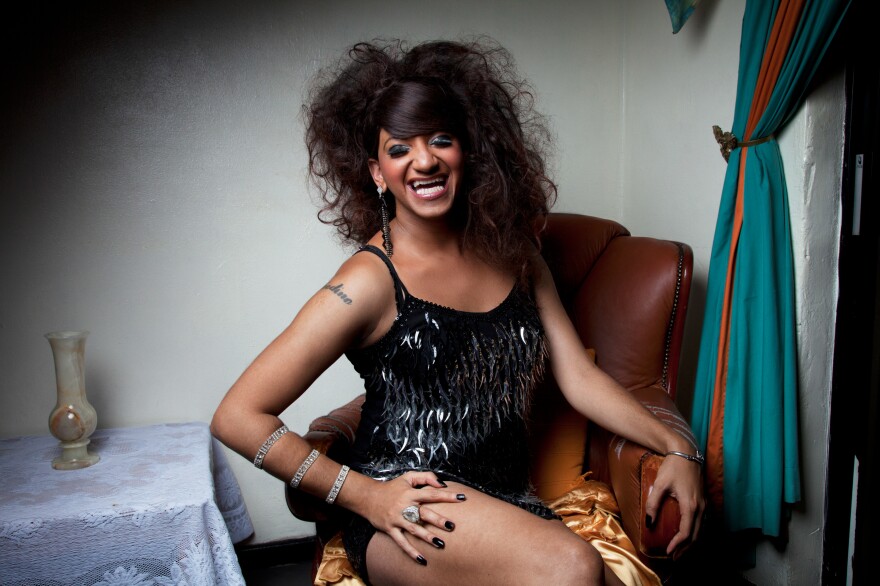
Gradually, beauty pageants became an important platform for the lesbian, gay, bisexual, transgender, queer and intersex communities who used them to openly celebrate their identities, free from the fear of arrest or government persecution.
For as long as Chedino can remember, pageants have served as a form of therapy — and escape. "I don't talk about my issues or troubles. Not even when things get really bad," she explains. She followed every pageant she could find — Miss South Africa, Miss World, Miss Universe — as they allowed her to enter a world far removed from her own.
Chedino secretly accompanied her cousin, Kauthar — Sharon's daughter — to pageants, where Kauthar was often competing. After Sharon left for work in the morning, the two girls would run off to rent a dress, and then walk or take a bus to the venue. "By the time Sharon got home from work in the evening, Kauthar would be sitting there with a crown and a sash," she laughs.

In high school, Chedino found herself living a double life. She played soccer and competed in Latin ballroom dance as a boy, but she says "I was pretending to be something my family and my peers wanted me to be." She was unhappy and uncomfortable. "I didn't know what I was. All I knew was that I was different."
One day, after signing up for a boys-only Latin dance competition, Chedino decided to take a major step — wearing women's clothing in public. "I suddenly had this feeling of 'Now or never.' I put on a Latin dress and danced as a girl for the first time. It felt so good, even if it was only for a second." Chedino and her partner ended up winning second place.
When Chedino was in her late teens, LGBTQ pageants were already wild, loud and long, and winning one could be a transformative experience. Even today, crowned queens and kings speak of "the power of the sash" — winners receive a sash and a crown — and they quickly become important ambassadors for their communities.

While South Africa slowly grew into its new role as Africa's economic powerhouse, Chedino, too, discovered a way of existing in the world that felt right — she loved wearing female clothing. "I could look at myself in a mirror and, for the first time, recognise the person who was looking back at me."
The more time she spent at pageants, the more Chedino was exposed to the LGBTQ community. She found a book written by RuPaul — the American drag queen and actor — which helped answer a lot of her questions, and she chatted to other LGBTQ contestants backstage or after a show. Years later, while volunteering at Gender DynamiX — now one of South Africa's biggest nonprofits for trans and gender-diverse communities — Chedino would, for the first time, meet someone who had gone through the full gender-affirming process, Caroline.
During their meeting, Chedino realized that she was a transgender woman. "I knew that this is what I wanted," she remembers. The encounter had a profound effect on Chedino. "I felt totally determined to follow my own dreams."

South Africa's new constitution — ratified in 1996 — included specific safeguards for LGBTQ rights, and to this day, South Africa remains the only country in Africa to have legalised same-sex marriage.
For Chedino, however, real equality remained elusive, and she was well aware of the dangers associated with being openly trans. Despite their legal protections, attacks on LGBTQ people continued — Black and LGBTQ people of color were, and still are, most affected.
According to Human Rights Watch, at least 24 LGBTQ individuals were murdered in South Africa in 2021. South Africa has an annual homicide rate of 42 per 100,000 people, among the deadliest in the world — there were more than 7,000 murders recorded in the third quarter of 2022 alone — and inadequate record keeping by its police force means the true number of murdered LGBTQ South Africans is likely far higher.
Chedino knows several people who have been killed, or who simply disappeared, including her friend Wendy, who was found stabbed to death after visiting a club the previous evening. "People say she left with two men. She never made it back home," Chedino remembers.

Yet Chedino was willing to take the risk. "I would do anything to become a woman in every sense of the word. I was no longer prepared to let others rule my life."
In 2003, Chedino decided to change the name her mother gave her at birth — she refers to it as her slave name. The name she ended up choosing — Chedino Rodriguez — was an amalgamation of two of her favorite things: American actor Matt Cedeño, who played Brandon Walker on Days of Our Lives in the early 2000s, and the passion and romanticism of Spanish culture.
As time went on, the stress of living her double life was becoming too much. "I was exhausted from running around with different overnight bags, asking people to keep my secret," Chedino remembers.
By stashing her dresses, wigs and shoes at friends' houses, Chedino had managed to keep her life as a transgender woman from her immediate family. But she desperately wanted her Aunt Sharon and her nieces and nephews to know who she really was. She wanted to celebrate her pageant wins together with them.
She didn't know how to start the "conversation," though, so Chedino's solution was to trigger it, rather than start it — by competing in a pageant that was being held in her own community.

The only person Chedino knew she had to tell beforehand was her mother, Alma, with whom she'd reconciled after many difficult years. Alma had been diagnosed with epilepsy, and Chedino was afraid the shock of seeing her on stage, dressed in women's clothing, might cause her mom to have a seizure.
On the night of the pageant, Chedino took Alma aside and quietly told her she was planning on taking part. "For a moment, she just looked at me," Chedino recalls. "Then she said, 'I've always known'."
"I had this sense of peace. I could breathe," she continues. But Chedino was still nervous: She had no idea how others in the audience — including her extended family — would react.
No one recognised her when she first walked out on stage. It was only when she spoke to answer the judges' questions that audience members recognized her voice.
But Chedino needn't have worried. "They shouted and cheered for me," she said. "It was priceless."
To top it all off, she won her first ever pageant, beating some of her gay and trans idols to take the crown. "It was a real turning point in my life," Chedino remembers. "I'm so glad I put myself out there like that. Winning gave me the confidence to push myself."
Chedino could not have hoped for a better "coming out."
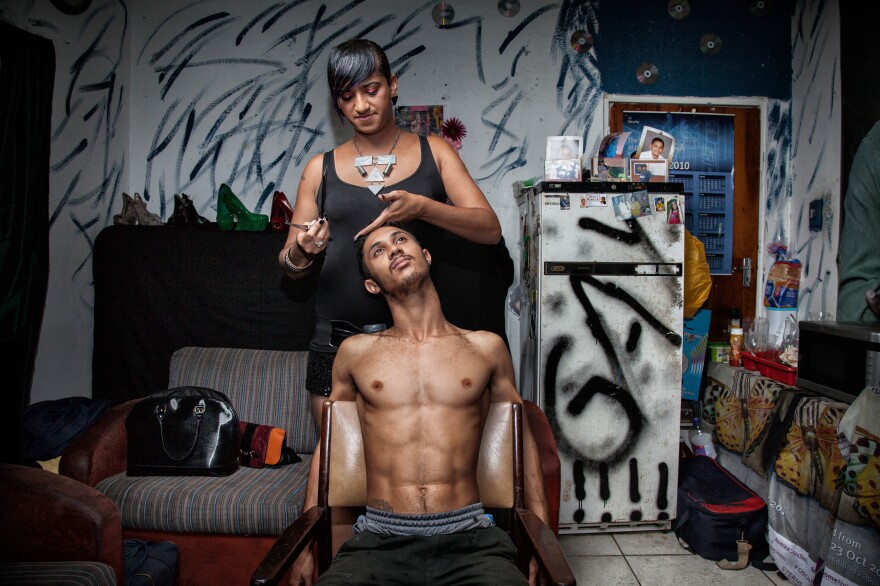
"My plan worked," she smiles.
In today's world of smartphones and internet search engines, someone looking to transition has a wealth of knowledge and experience available to them.
In Chedino's day, however, there was little information available. She knew nothing about gender-affirming care, the risks of the surgeries, or what to expect along the way. She didn't know the names of the few doctors and nurses who had experience working with transgender individuals. There were almost no facilities, no guidelines or best practices.
One of the few organizations to be active during this time was the Triangle Project, a nonprofit providing health services for the LGBTQ community.
Relying on an informal network of other trans people, especially older transgender queens who had gone through the process of transitioning and seeking out gender-affirming care, sometimes decades earlier, Chedino picked up bits and pieces of information, anecdotes and tips.
She was told to start by taking Premarin — a drug normally used to increase the levels of estrogen in women who are unable to produce enough naturally. It would help soften her skin and encourage her breasts to grow.
Premarin was easy to get hold of. Chedino would buy the pills from an obliging medical staff member at a local clinic or someone would deliver them to her home. When Premarin wasn't available, Chedino would buy under-the-counter birth control pills from the nurses there for 30 rand ($1.64) per bag. The drugs could cause less desirable side effects too — including, for Chedino, violent mood swings.

In South Africa, gender-affirming surgery is classified as a cosmetic procedure and therefore isn't covered by medical insurance. The cost of the procedure — 300,000 ZAR (approximately $16,500) — is prohibitively expensive for many transgender men and women in a country with an average annual salary of 374,000 ZAR, or $20,585.
The unemployment rate among LGBTQ people in South Africa is high, too. A recent study by UCLA's Williams Institute found that just 14.9% of gender-nonconforming LGBTQ people in South Africa are part of the paid labor force — and those who are employed often conceal their gender identity at work out of fear of being discriminated against.
Some trans men and women who could not pay for the procedure resorted to backstreet options, but they were incredibly risky, often carried out in private homes or after-hours at ill-equipped clinics.
Sandra Dee, a transgender woman now in her mid-60s, was scheduled for a backstreet surgery in Johannesburg in 1980, to be carried out at the house of the doctor who was willing to perform the surgery. Shortly before her own operation date, two of her friends died undergoing a similar procedure. "I got scared and so I didn't go through with it," Sandra explains.
Chedino knew she would never be able to afford gender-affirming surgeries for herself. Yet, like Sandra, she wasn't prepared to risk her life by opting for a backstreet operation, either.
The only thing to do was wait for a miracle.

Cape Town's Groote Schuur Hospital — one of the few centers in South Africa that specializes in transgender health care — had run a clinic for transgender men and women in the 1990s. But with some of the surgical techniques required for gender-affirming surgeries still to be developed, and because of a lack of understanding of the needs of transgender people, the program was controversial and, in 2000, it was shut down.
A few years later, Chedino heard rumors about a waitlist. She went to see a doctor at Groote Schuur and signed up. What Chedino did not know is that she'd joined an unofficial list that comprised yet more lists collected by other doctors. There was no transparency and little guidance.
It was not until 2009, with the founding of The Transgender Clinic — a new transgender care project at Groote Schuur — that things became more structured. Led by Dr. Kevin Adams — a senior specialist in plastics and reconstructive surgery based in Cape Town — the clinic, for the first time, brought together psychiatrists, endocrinologists and plastic surgeons to address the unique needs of their transgender patients.
South Africa did not have — and still doesn't have — a nationwide program for transgender care, and Dr. Adams knew that simply applying the guidelines set out by the World Professional Association for Transgender Health would not be practical.
"What we need is a set of guidelines specific to the South African context and culture whilst maintaining accessibility," Adams explains.
All funding for the Transgender Clinic came out of Groote Schuur's Plastics Department's budget, which it had to share with, among others, breast reconstruction for cancer patients, penile reconstruction for victims of botched male circumcisions and the treatment of serious burn victims.
Adams was told he could perform four full gender-affirming procedures per year. Because of his tight budget, he chose to only offer the free surgeries to residents of Western Cape Province, which includes the city of Cape Town. And, in order for the system to be as transparent as possible, he decided on a first come, first serve system.
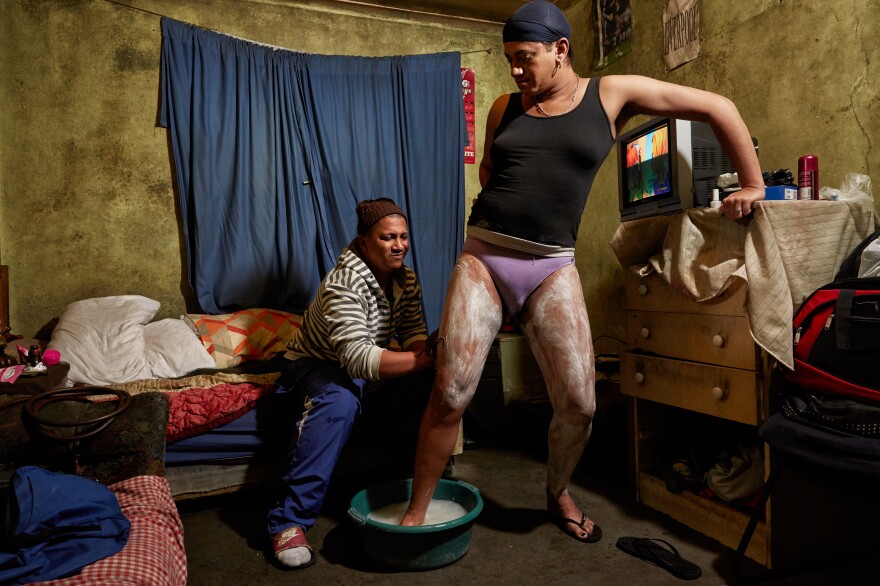
In the clinic's first years, the number of candidates was relatively low. Dr. Adams saw between 12 and 16 new patients per year, mainly those left over from Groote Schuur's original program. As word spread, though, the list of candidates grew exponentially, and the waiting time became longer and longer.
"We're only now working with transgender individuals who signed up in 2011. We haven't even started on those who joined as part of the exponential growth curve," Dr. Adams explains.
Currently, there are more than 300 people on the waitlist. New candidates face a decadeslong wait before they'll be eligible for a procedure — and the only way to move up the list is if another candidate pulls out, is no longer eligible or dies.
The long wait poses an unexpected challenge for Dr. Adams and his team. As gender definitions shift, so do the wishes and expectations of his patients. "We've adapted our program to accommodate for nonbinary or gender fluid candidates, some of whom might only want breast augmentation."
When Chedino joined the list in 2010, she was told she'd likely have to wait 25 years. To qualify, she first had to spend close to a year completing a range of tests and appointments with the clinic's team, including Dr. Adams himself.
Her first meeting with Dr. Adams — the only qualified surgeon in all of South Africa who could carry out the full range of gender-affirming surgeries — was one Chedino says she will never forget. "That's the day my name went into his book, the book that changed my life," she recalls.
All Chedino could do was try to stay healthy, mentally as well as physically. Once a year, she'd get a checkup to see if her body and mind were still fit enough to endure the surgeries.

Chedino would sit in Dr. Adams' office with her stomach in knots, waiting for the results of her tests. Paradoxically, the hormones and drugs Chedino took as part of the hormone treatment could also cause side effects that might exclude her from getting her gender-affirming surgery.
Each visit, she prayed that Dr. Adams would walk in and tell her she'd be his next client. Sadly, each visit she left disappointed.
According to the South African Society of Psychiatrists, trans men and women are at higher risk of experiencing depression, anxiety and other mental health conditions, with nearly a third reporting having attempted suicide.
Chedino's mental health suffered as her time on the waitlist grew. "I became very despondent," she recalls. "But what choice did I have? I just picked myself up again and just pushed onwards." She celebrated birthdays; she worked as a hairdresser; and she continued to compete in pageants.
In 2014, on a date with an old friend, Keagan Martin, she fell in love. "He was different from other guys I'd been with. Instead of feeling judged, I felt accepted," she explains.
Keagan felt the same way. "I got hooked on her personality. She was everything I was looking for in a woman. She was a real partner," he remembers.
But Keagan hadn't dated a transgender woman before and he was unsure of what to expect. He didn't know what their relationship would be like and he was "worried about other people, how they would treat us."
The more time Chedino and Keagan spent together, however, the closer they grew. "Everyday, I fell more in love with her. She was so beautiful. And she wasn't afraid to stand up for herself."
Two years later, at a party with friends and family, Keagan asked Chedino to marry him. "I was so nervous," he laughs. It was important to Keagan that he proposed in front of his family and their friends. "I wanted everybody to see how much she meant to me."
"It was a beautiful moment, one that I will treasure forever — even if he did put me on the spot," Chedino smiles. She moved in with Keagan shortly afterward.

Then, on Valentine's Day in 2017, Chedino finally got the news she had been waiting for: During her visit to Dr. Adams' office, he told her to get ready, as she would undergo her surgeries that August.
"My heart was racing," she remembers. "I couldn't wait to get home and tell Keagan."
For Keagan, the most important thing was that Chedino could be herself. "That is who I fell in love with. It was never about the surgery. If she had decided not to go through with it, I would have loved her just as much."
Yet, despite all the support from Keagan, her family and the staff at the clinic, Chedino says the six months before her operation were some of the longest and loneliest of her life.
"I knew I wanted this and needed this so much, but I was so scared," she recalls. "There was no one who'd gone through it to hold my hand and tell me, 'It's going to be okay'."

On Aug. 17, 2017 — 17 years after first hearing about a waitlist, and seven years after her name was added to Dr. Adams' big book — Chedino was wheeled into the operating theater at Groote Schuur Hospital.
There, two teams of surgeons were waiting for her. One would work on Chedino's "top" surgery — a breast augmentation with implants to enhance the size of her breasts — while Dr. Adams carried out her "bottom" procedures — an orchiectomy to remove her testicles and a vaginoplasty to transform and reconstruct her genitalia.
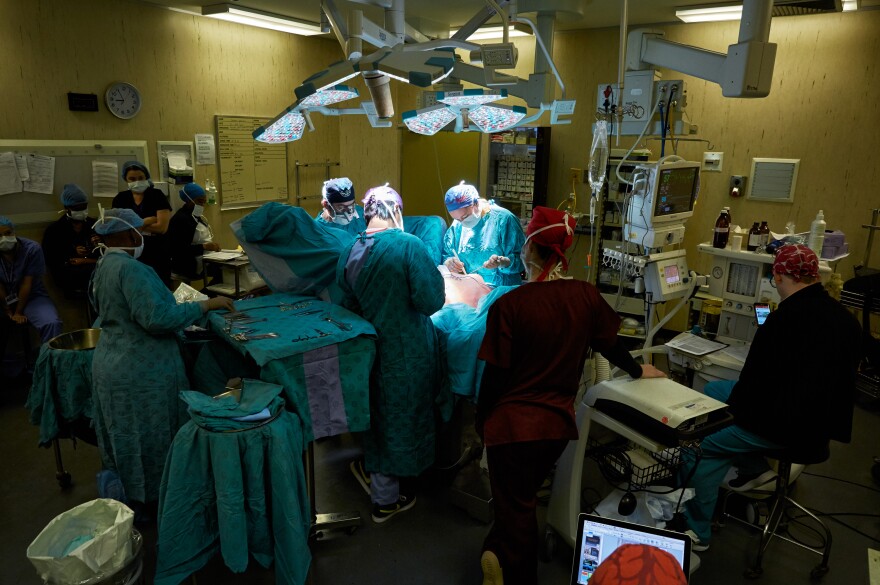
Although she could have opted to have the surgeries spread out over time, Chedino explains "I wanted to go through all of it at once, and not drag it out."
Keagan had to work the day of the operation and couldn't be with Chedino. He spent the day praying that nothing would go wrong. "I was so worried she would not make it."
Five-and-a-half hours later, Chedino was wheeled out of the operating theater and into a recovery room. Everything had gone according to plan.
Nothing could prepare Chedino for the amount of pain she found herself in immediately after the surgery. "It was indescribable," she remembers. "It was so bad. I just wanted it to stop."
Thanks to the painkillers, the first few days of recovery were a blur. Chedino remembers Keagan being there when she woke up; and she remembers how strange it felt to lie in bed with her legs open with a group of doctors inspecting her new breasts and genitals — Chedino prefers to call them her "assets."


A strong and independent woman, Chedino suddenly found herself in an unfamiliar situation — she felt helpless. The worst was not being able to use the bathroom, instead having to rely on a catheter. "It made me feel so powerless, like I was an old woman in a nursing home," she recalls.
Dr. Adams kept a close eye on how well Chedino was healing. Five days after her surgery, the catheter was removed. Chedino was told that if she managed to pee on her own, she would be allowed to go home.

Determined to prove that she could, Chedino dragged herself to the bathroom. For a moment, nothing happened. "Then, I started screaming — because of the swelling, the pee came, but it sprayed everywhere," Chedino laughs. She had passed the pee-test, and was allowed to go home.
It would take more than three months for the pain to become manageable and Chedino would need close to a year to fully heal. She had to re-learn how to walk, how to go to the bathroom and how to have sex.
Keagan nursed Chedino through many painful nights and then had to get up and go to work the next morning. But he feels it was all worth it. "It was what I signed up for. Now, I can look back and be glad that we went through it together."
Eventually, with Keagan's help, Chedino was able to fully embrace her female body. "It's no longer torture for me to look at myself in the mirror. I feel whole."


On June 30, 2018, Chedino and Keagan married in Cape Town's Muizenberg Civic Centre. The wedding almost didn't happen as Keagan was stabbed in the leg during a robbery only a few days prior. "It was her turn to nurse me," Keagan laughs. "But I was going to get married no matter what, even if it was on crutches."
Since her surgeries, Chedino has become a respected member of the transgender community and she's been accepted by her own family. Now an "older" queen with valuable experience, Chedino is able to offer the help and guidance to younger trans women she desperately needed all those years ago.


Despite now feeling like herself, Chedino had grown insecure about competing in pageants since her gender-affirming surgeries. She even considered retiring from pageantry altogether, confiding in Keagan that she felt old and that she had lost her confidence. Keagan, however, was convinced she could still compete and repeatedly encouraged her to do so.
"Then, one day, she told me she would do it so that I would stop asking," Keagan recalls. After winning the first pageant she competed in since her surgeries, Chedino was hooked once again.
Chedino has faced challenges resulting from her surgeries, though — getting access to the health professionals able to help her hasn't been easy — and she still faces discrimination in public, sometimes from surprising places.
Having physically transitioned, Chedino found herself unable to compete in some pageants, whose organizers argued that because Chedino had breast implants and no longer needed to "tuck" — literally tucking the penis and testicles between the legs to create a smoother, more feminine appearance — Chedino had an unfair advantage over contestants who had not yet received their gender-affirming surgeries.
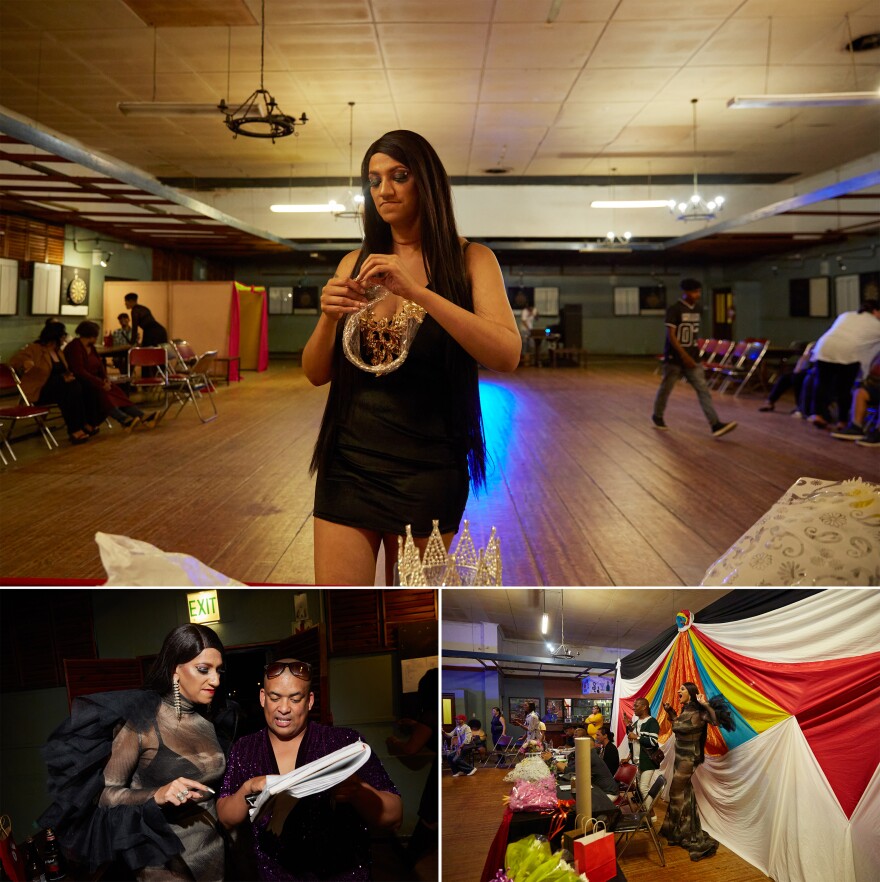
"Suddenly, I did not belong to the same community that had accepted me for so many years," Chedino explains. That didn't sit right with her. "I was winning those same pageants before my surgery, so why am I now an outcast?"
In response, Chedino and Keagan started their own pageant, "Miss Calendar Girl," that is open to LGBTQ people and celebrated its fourth anniversary in May.
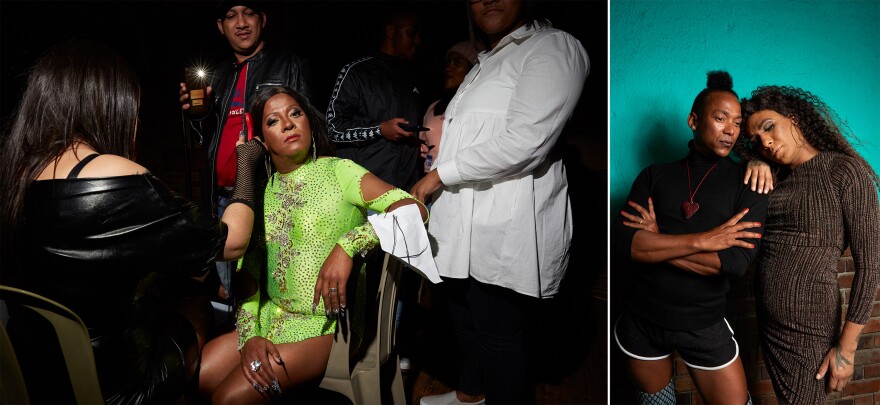
And so pageants continue to be her escape.
In December 2020, Chedino was crowned Miss Transgender South Africa 2021. Although she had been victorious many times in her career — having won, by her own count, somewhere between 80 and 100 pageants since she first stepped out on a stage as her true self in front of her mother, aunt, nieces and nephews all those years ago — Chedino had never won an official transgender pageant.
"My sash always read 'Ms. Gay' or something," she explains. "Being crowned Miss Transgender South Africa finally meant validation as a woman."
In September 2022, Chedino heard about the Miss Trans Africa pageant after bumping into an old friend while at the Groote Schuur Hospital for a routine checkup. Chedino immediately knew she wanted to take part, as it would be her most important competition to date. "I want to be challenged. That's why I love pageantry. Because I can compete against other fierce women."
But she was late in applying and only had one week before the submission deadline. Also, the pageant already had a South African contestant. The only way for Chedino to take part was to pick one of the countries still available.
Chedino chose Egypt. "I was thinking, 'I could do Cleopatra'," she recalls with a laugh. However, Chedino quickly learned about the country's dismal human rights record. "I realized that Egypt didn't have any of the LGBTQ rights we have here in South Africa. If I, as a transgender woman, could help change that somehow, that would be a good cause."

On March 11, 2023, after reaching the final five — together with Miss Nigeria, Miss Zimbabwe, Miss Liberia and Miss Cameroon — Chedino won and was crowned Miss Trans Africa.
Four days later, in her first official engagement as Miss Trans Africa, Chedino visited Heideveld High, the same school where she competed in her very first pageant all those years ago.
When thinking back to her 3-year-old self on that rainy night in 1986, Chedino considers herself lucky. She is convinced that seeing her Aunt Sharon in that doorway saved her life. "It lit a fire in me that never died. This was my long wait for freedom."
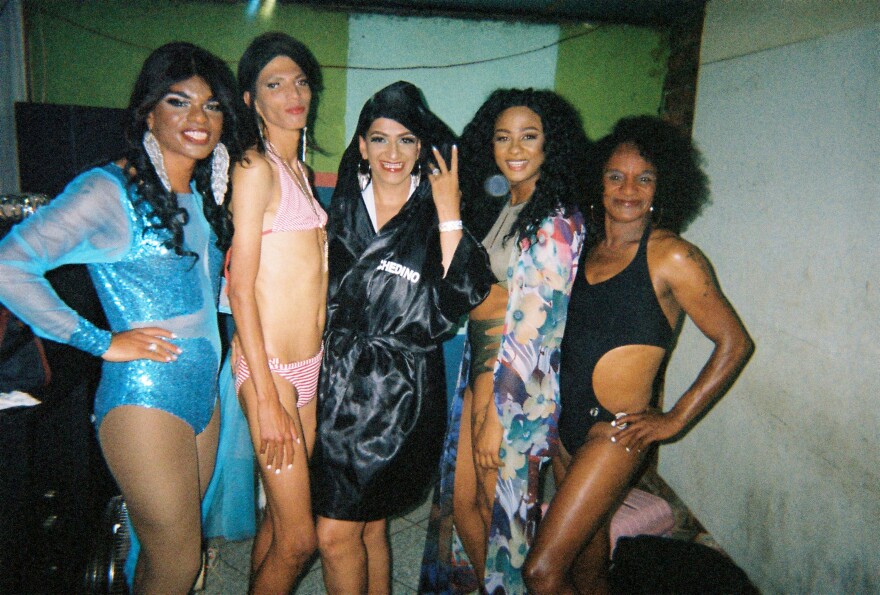
Catie Dull photo edited and Zach Thompson copy edited this story.
Nick Schonfeld divides his time between writing children's books and working on stories about affordable health care, gender equality, education and distributive justice.
See more of Julia Gunther's work on her website or follow her on Instagram: @juliagunther_photography.
Copyright 2023 NPR. To see more, visit https://www.npr.org.






